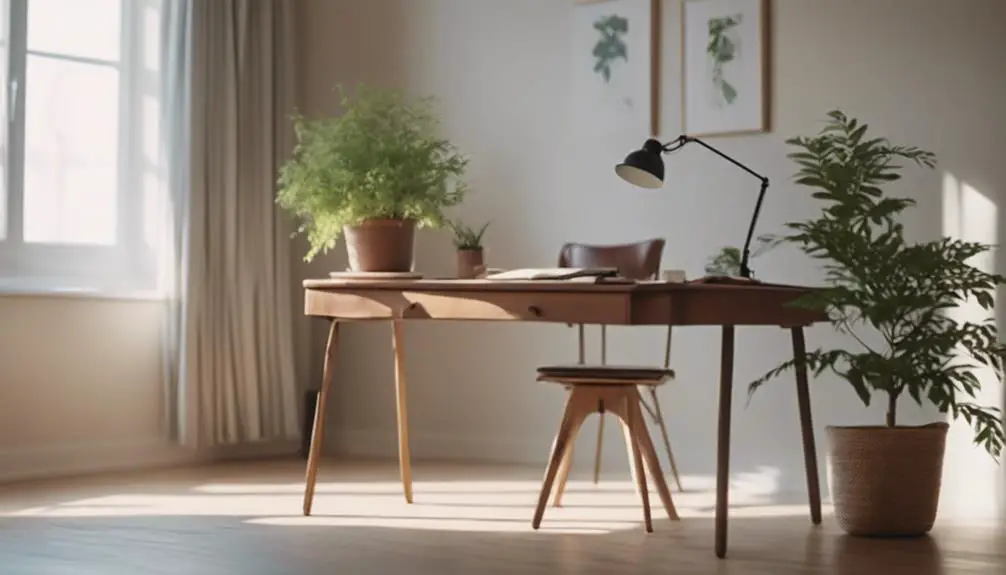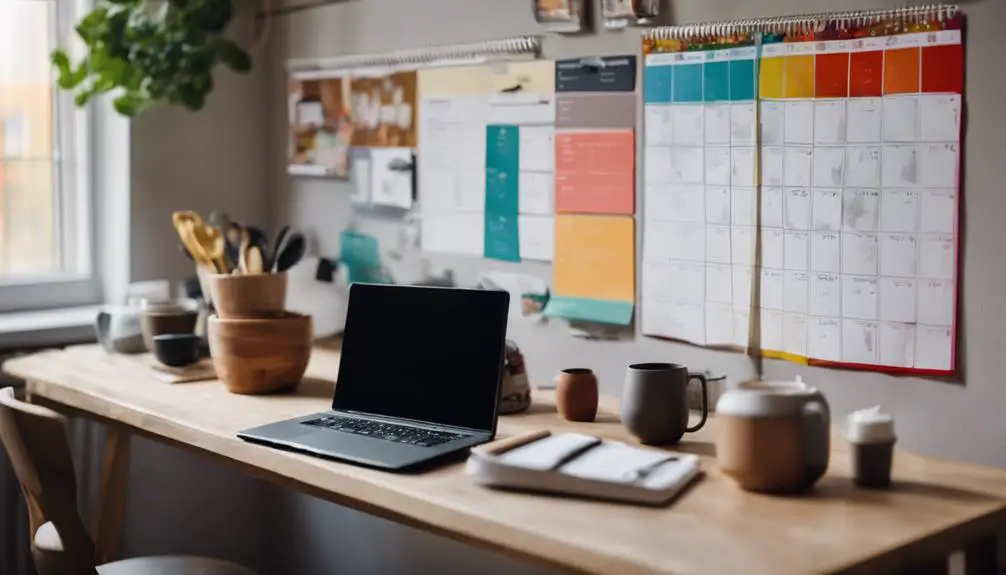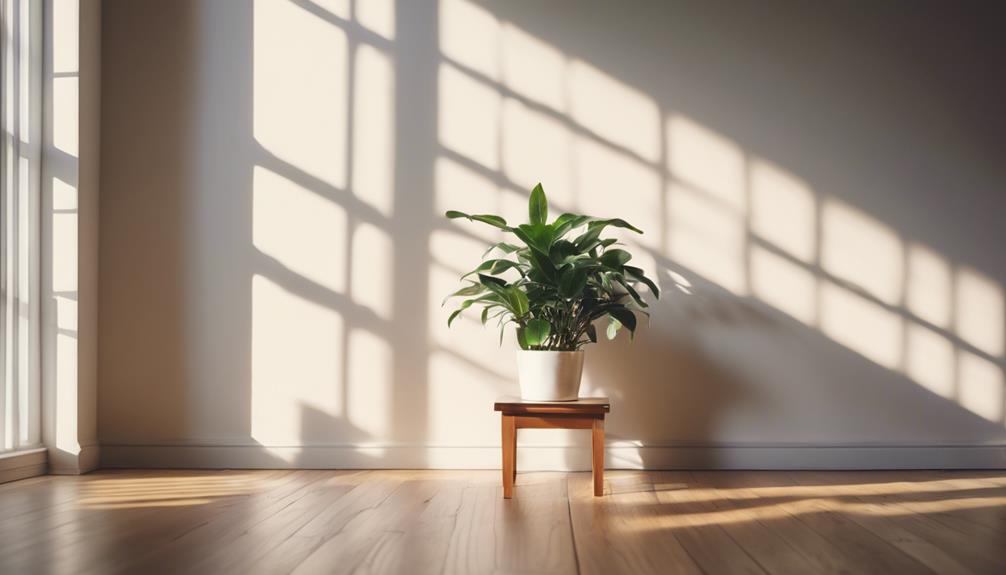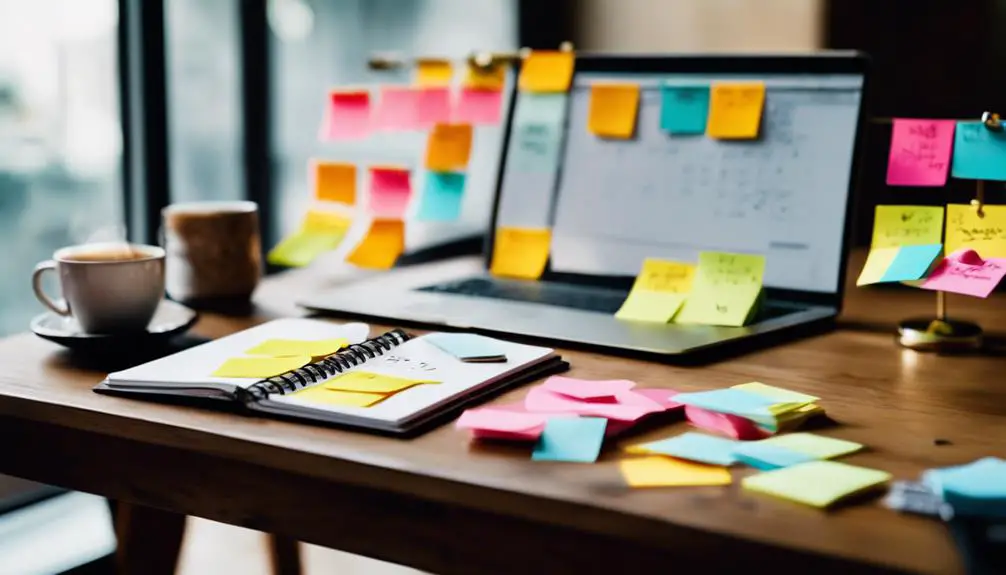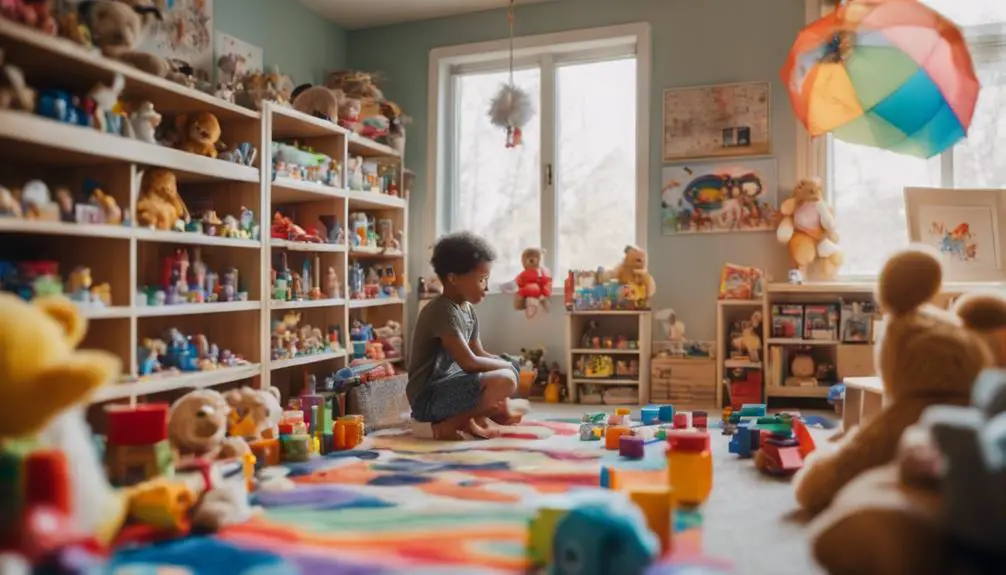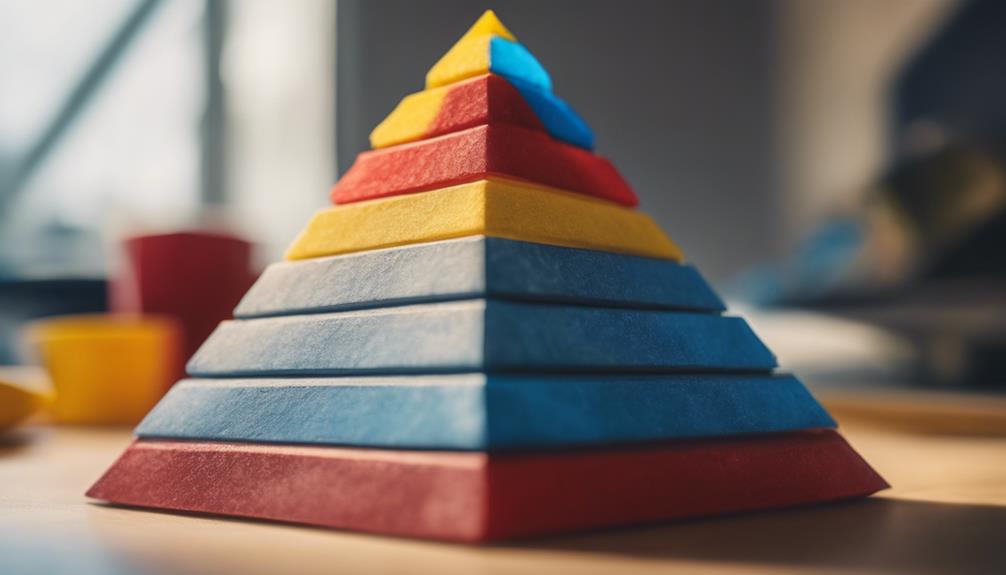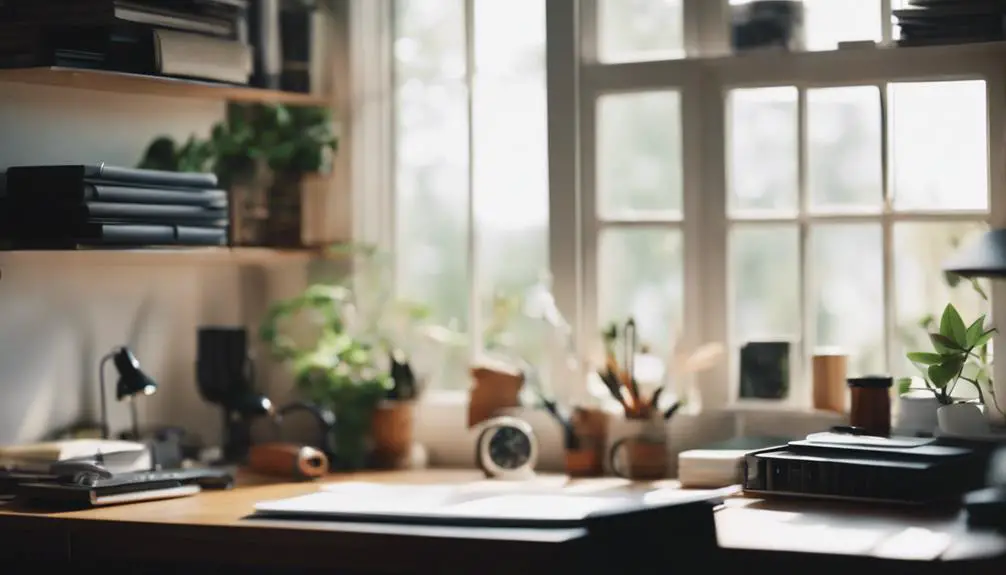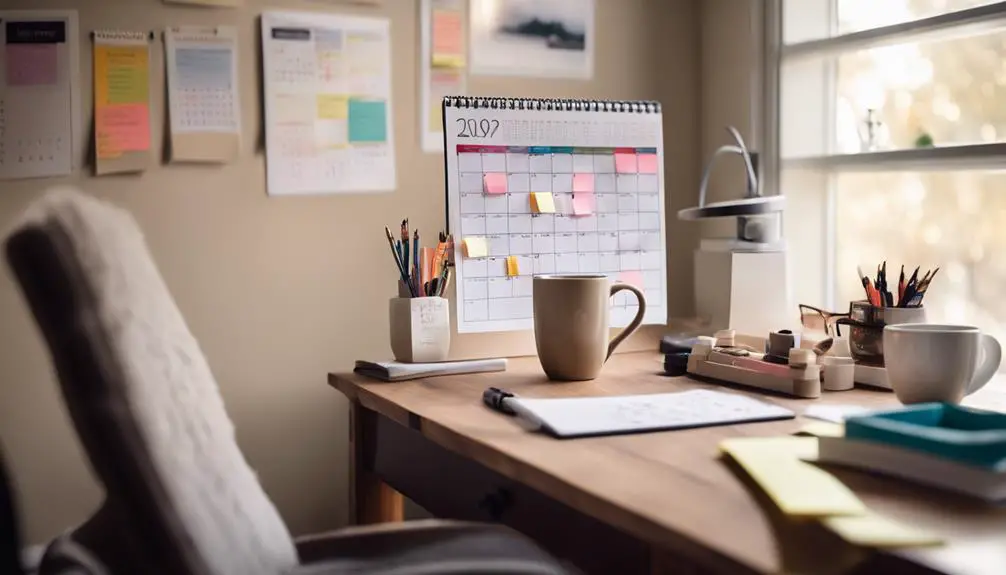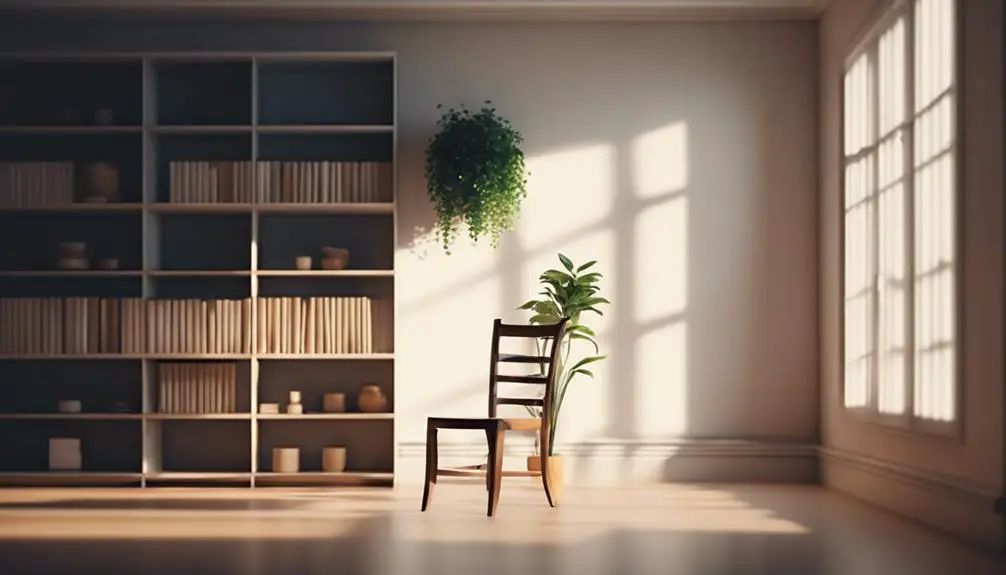A clutter-free environment can significantly enhance your daily experience. For individuals with ADHD, embracing minimalism may unlock better focus and reduced distractions. Simplifying your surroundings helps create a space that fosters mental clarity, making it easier to navigate the overwhelm that often accompanies ADHD.
However, it’s essential to recognize that minimalism may not work for everyone and can come with its own set of challenges. Finding the right balance could offer valuable insights that resonate with your personal journey.
For example, consider the impact of a clean workspace. Removing unnecessary items from your desk can reduce visual distractions, allowing you to concentrate better on tasks at hand. Organizing your environment can also streamline your daily routines, making it easier to locate items when needed, thus minimizing frustration.
Additionally, using storage solutions, like clear bins or drawer organizers, can help keep essential items accessible while maintaining a tidy space.
Ultimately, the goal is to create an environment that supports your unique needs and enhances your overall well-being. Minimalism may serve as a helpful tool in this process, but adapting it to fit your lifestyle is crucial for achieving lasting benefits.
Understanding Minimalism
Adopting minimalism can significantly alter both your surroundings and your perspective. This lifestyle encourages a focus on what’s genuinely important, allowing you to escape the turmoil of excess. Mindful consumption becomes instinctive, enabling you to intentionally select your belongings. By valuing quality over quantity, you can establish a space that isn’t only visually appealing but also emotionally satisfying.
Aesthetic simplicity is crucial in this process. It involves eliminating distractions, resulting in an environment that enhances clarity and tranquility. Envision entering a room that feels spacious and welcoming, where each item serves a clear purpose. This kind of simplicity invites deeper engagement with your surroundings, cultivating a sense of serenity and liberation.
As you clear away clutter from both your physical space and your mind, you’ll discover the pleasure of living with less. Minimalism transcends being merely a trend; it represents a route to a more enriching life. Embracing this approach enables you to release what no longer benefits you, thus creating space for experiences and relationships that genuinely enhance your existence.
For those seeking to implement minimalism in your home, consider starting with a specific area, such as your living room. Choose versatile furniture pieces with clean lines that serve multiple purposes, like a coffee table that doubles as storage. Opt for a limited color palette to maintain a cohesive and calming atmosphere. Incorporating plants can also add life to your space without overwhelming it, promoting both aesthetic appeal and well-being.
As you embark on this journey, remember that each small change contributes to a larger transformation.
ADHD: An Overview
ADHD presents a variety of symptoms that influence your ability to concentrate, organize, and handle daily responsibilities. These difficulties can make regular life seem daunting, affecting various aspects such as employment and personal relationships. Recognizing these symptoms is crucial for developing effective methods to manage and flourish despite the challenges ADHD brings.
For instance, someone with ADHD might struggle to keep track of tasks at work, leading to missed deadlines or incomplete projects. This can create frustration both for the individual and their colleagues.
In relationships, forgetfulness or difficulty in following conversations can lead to misunderstandings, which may strain connections with friends and family.
Finding strategies that work involves examining specific symptoms and determining which tools or techniques can best support daily routines. Consider using planners or digital apps designed to enhance organization. These tools can help break down tasks into manageable steps and set reminders for important deadlines, making it easier to stay on track.
Moreover, engaging in mindfulness practices or physical activities can also aid in improving focus and reducing stress.
Understanding and addressing these symptoms not only empowers individuals with ADHD but also fosters better communication and support from those around them.
ADHD Symptoms Explained
Recognizing ADHD symptoms is vital for understanding how this condition affects everyday life. Many individuals face various hurdles that can hinder their pursuit of independence. Here are some prevalent symptoms:
- Impulsivity: Acting without considering the consequences can lead to decisions you may regret later.
- Inattention: Difficulty concentrating on tasks can result in frustration and feelings of being overwhelmed.
- Restlessness: An inner sense of unease often makes it challenging to unwind and relax.
- Disorganization: Maintaining order can feel daunting, leading to chaos that complicates daily routines.
Grasping these symptoms allows you to develop effective strategies for managing impulsivity and improving focus. Implementing tailored techniques can cater to your specific experiences and empower you to regain control.
Acknowledging these patterns enables you to create an organized environment that highlights your strengths while minimizing distractions. Achieving a sense of freedom isn’t merely a fantasy; it can be realized through awareness and personalized strategies that honor your unique needs.
For instance, using planners or digital apps can greatly assist in organizing tasks and managing time effectively. Products like the Todoist app or physical planners designed for ADHD can help streamline daily schedules and keep you on track.
Creating designated spaces for important items can also alleviate the stress of disorganization. Embracing these changes can lead to a more balanced and fulfilling life.
Impact on Daily Life
Living with ADHD can significantly alter your daily life, presenting a range of challenges that impact work, relationships, and personal well-being. Focusing, managing time, and prioritizing tasks may become difficult, often leading to frustration and feelings of being overwhelmed. Embracing minimalism can assist in regaining control by minimizing distractions and streamlining your surroundings.
Here are ways minimalism can enhance your daily routine:
| Positive Impact | Practical Strategies |
|---|---|
| Fewer Environmental Distractions | Regularly declutter your living and working spaces, removing items that do not serve a purpose or bring joy. |
| Enhanced Task Prioritization | Implement checklists to organize daily tasks; this method helps keep track of what needs attention and reduces anxiety about forgetting important responsibilities. |
| Increased Focus | Set up a specific workspace that is free of clutter and distractions, allowing for improved concentration on tasks at hand. |
The Impact of Clutter
Clutter can lead to cognitive overload, making it difficult to maintain concentration, particularly for individuals with ADHD. The presence of disorganization may serve as a constant distraction, increasing feelings of frustration and diminishing focus.
The emotional reactions triggered by a chaotic environment can contribute additional stress to everyday life. For instance, a cluttered workspace can hinder productivity, making tasks feel overwhelming and unmanageable.
Addressing clutter can create a more calming atmosphere, allowing for improved mental clarity and a sense of control. Taking steps to organize your surroundings not only enhances your ability to concentrate but also fosters a more positive emotional state.
Clutter’s Cognitive Overload
Research indicates that cluttered environments can significantly hinder cognitive function, particularly for individuals with ADHD. When surrounded by disorder, sensory overload can occur, making it difficult to concentrate or think clearly. This mess not only distracts you but also reduces cognitive clarity, obstructing your quest for freedom and tranquility in life.
Consider the impact of clutter on your well-being:
- Heightened stress levels: A disorganized space can amplify anxiety, leaving you feeling overwhelmed and uneasy.
- Challenges in task prioritization: When everything seems urgent, it becomes hard to identify what truly matters, leading to confusion.
- Tendency to procrastinate: Clutter can act as a barrier to action, allowing you to avoid tasks and trapping you in a cycle of inaction.
- Increased mental fatigue: Your brain expends extra energy processing unnecessary distractions, which can leave you feeling drained.
Addressing clutter is crucial for enhancing focus and mental clarity. Organizing your space can lead to a more serene environment, promoting better cognitive function and overall well-being.
Consider practical solutions such as storage bins, organizers, or decluttering apps to help streamline your space.
Distraction and Focus Issues
When disorganization surrounds you, maintaining focus can be extremely difficult, particularly for individuals with ADHD. Clutter serves as a distraction, diverting your attention from essential tasks. This overwhelming sensory input can hinder your ability to think flexibly, making it challenging to prioritize what needs to be done.
To address these challenges, consider techniques that enhance your space’s organization. Reducing visual distractions helps cultivate an environment that aligns with your attention strategies. Simplifying your surroundings can increase your motivation, enabling you to engage with tasks without being bogged down by clutter.
Establishing a clear order of tasks allows you to break larger objectives into smaller, more manageable steps. This approach helps you keep moving forward, even when motivation wanes. It’s crucial to recognize that your environment significantly impacts your concentration abilities.
For instance, utilizing storage solutions like bins or shelves can minimize visual chaos, while tools such as task management apps can aid in organizing priorities. Creating a designated workspace free from unnecessary items can also enhance focus and productivity.
Emotional Responses to Messiness
A cluttered space can stir up a storm of emotions, particularly for individuals with ADHD. The disorder around you doesn’t merely distract; it can intensify emotional triggers, resulting in feelings of frustration and overwhelm.
In disorganized surroundings, sensory overload can occur, making the mess feel suffocating and difficult to manage. This often leads to a deep desire for tranquility and liberation.
Here are some typical emotional reactions you might encounter in a disordered environment:
- Frustration: When you struggle to locate essential items, feelings of anger or irritation can arise.
- Anxiety: A chaotic atmosphere can foster a persistent sense of discomfort, hindering your ability to unwind.
- Overwhelm: You may experience a sense of paralysis, feeling unable to take any steps forward amid the disorder.
- Shame: An untidy space can evoke feelings of inadequacy, as if you’re falling short in managing your responsibilities.
Understanding these emotional reactions is crucial for creating a calmer living space.
Adopting a minimalist lifestyle might enable you to reclaim your sense of autonomy, helping you to flourish instead of merely existing.
For instance, consider implementing organizational tools such as storage bins or label makers to simplify your environment. These practical solutions can make a significant difference in how you feel and function daily.
Minimalism and Focus
Minimalism serves as an effective strategy for improving focus, particularly for those with ADHD. Simplifying your surroundings creates an environment that reduces sensory overload, allowing for better concentration. When clutter is minimized, the mind is less likely to chase after numerous distractions, enabling you to direct your energy towards what’s genuinely important.
In a minimalist setup, it becomes easier to select mindful distractions—those that enhance your focus instead of hindering it. For example, listening to soothing music or concentrating on a single task can promote a deeper level of engagement. With fewer choices available, the freedom to focus becomes more apparent, helping you maintain mental stability.
Less visual clutter allows your brain to hone in on the task at hand. This clarity often results in heightened productivity and a fulfilling sense of achievement.
When you craft an intentional workspace, you empower yourself to explore your interests without the burden of unnecessary distractions. Thus, minimalism transcends the concept of simply having less; it opens up space for more of what truly motivates and inspires you.
Reducing Distractions
Clutter serves as more than just a physical hindrance; it significantly disrupts your capacity to concentrate. Embracing minimalism allows you to create mindful environments that encourage sensory regulation and purposeful living. Reducing distractions helps cultivate a focused atmosphere, enhancing both productivity and tranquility.
Here are four emotional advantages of minimizing distractions:
- Liberation from Overwhelm – A clear space promotes mental clarity, alleviating the chaos that can lead to anxiety.
- Enhanced Clarity of Thought – A visually simple environment nurtures clear thinking, empowering you to approach tasks with assurance.
- Boosted Creativity – An organized setting sparks innovative ideas, allowing you to explore new avenues.
- Sense of Calm and Comfort – Soothing aesthetics create a relaxing backdrop, enabling you to work with ease.
Creating a serene, organized space is essential for mental well-being. It allows you to focus on what truly matters while reducing the noise of everyday distractions.
Simplifying Daily Routines
Streamlining your daily routines can significantly lessen the mental burden that often accompanies ADHD. Simplifying your morning and evening rituals reduces decision fatigue, allowing space for mindful habits. Begin with small steps; prioritize tasks to clarify what truly matters for your day.
Using organizational tools enhances consistency in your routines, making it easier to establish new habits. Incorporating self-care practices into your daily schedule helps you recharge and alleviate stress. Here’s a straightforward framework to guide you:
| Routine Element | Morning Rituals | Evening Routines |
|---|---|---|
| Key Focus | Emphasize self-care | Reflect on the day |
| Mindful Habits | Journaling or meditation | Reading or light stretching |
| Organizational Tools | Planner or checklist | Digital reminders |
In the morning, focusing on self-care sets a positive tone for the day. Engaging in journaling or meditation can help clear your mind and prepare you for the tasks ahead. For your evening routine, reflecting on the day allows you to process experiences, while light stretching or reading can promote relaxation before bedtime.
Using tools like a planner or checklist in the morning can streamline your tasks, while setting digital reminders in the evening ensures you stay on track. These strategies will not only help create a more manageable daily routine but also encourage the formation of positive habits that support your well-being.
Benefits of a Minimalist Space
Establishing a minimalist environment can significantly diminish distractions that often impede your ability to focus. With a reduced number of items in your surroundings, concentrating on tasks becomes more manageable, leading to improved organization.
A streamlined space not only facilitates better management of your possessions but also promotes mental clarity, which is essential for enhancing productivity.
For instance, consider removing non-essential furniture or decor that serves no functional purpose. This creates an open atmosphere that encourages a more focused mindset.
Additionally, maintaining only the items you truly value or need can make your space feel less cluttered and more inviting. Simple organizational tools, such as clear storage bins or minimalist shelving, can further aid in keeping everything in its designated place, ensuring that your environment supports rather than hinders your work.
Reduced Distractions
Stepping into a minimalist space can bring a refreshing sense of calm, especially beneficial for individuals with ADHD. The essence of reduced distractions is how it enhances mental clarity and helps manage distractions effectively.
A well-designed environment leads to improved cognitive organization, enabling better task prioritization.
Here are four key advantages of adopting a minimalist approach:
- Visual Simplicity: A space with fewer items leads to less sensory overload, making it easier to concentrate on tasks.
- Space Optimization: An organized area minimizes clutter and confusion, ensuring a smoother workflow.
- Effective Organization Techniques: Simple systems allow for easy access to necessary items, boosting efficiency.
- Focus Strategies: Creating a tranquil atmosphere helps direct your energy towards important tasks without frequent interruptions.
Adopting a minimalist lifestyle transforms your environment into a sanctuary that encourages personal growth.
This approach isn’t merely about aesthetics; it serves as a robust strategy for managing distractions that often impede progress. A minimalist space empowers you to regain your focus and thrive in an environment tailored for success.
Enhanced Focus
A minimalist space not only minimizes distractions but also significantly enhances your capacity to concentrate. With fewer items competing for your attention, you establish a mindful environment that fosters deeper focus. Embracing structured simplicity allows your mind to engage in tasks with greater ease, ultimately nurturing your creativity.
Consider the transformation of your workspace:
| Cluttered Space | Minimalist Space | Benefits |
|---|---|---|
| Overloaded desk | Clear surface | Easier to concentrate |
| Chaotic colors | Neutral palette | Calming effect on the mind |
| Cluttered walls | Open space | Encourages fresh ideas |
In this tranquil setting, your energy flows unimpeded by unnecessary items. You free yourself from visual noise, enabling effective focus. Reducing clutter in your surroundings allows you to unlock your potential, leading to enhanced clarity. Adopting a minimalist lifestyle can significantly improve focus, enabling you to pursue your passions with renewed enthusiasm.
Consider incorporating specific items to enhance your minimalist environment, such as a simple desk organizer to keep essential tools at hand without clutter or a calming color palette for your walls to promote tranquility. Choosing functional furniture with clean lines can also contribute to a serene atmosphere, making it easier to maintain the focus necessary for productivity.
Simplified Organization
Minimalist spaces enhance your organization, making it simpler to find and access what you need. When you embrace simplified organization, you cultivate a liberating sense of freedom. With reduced clutter, your focus shifts to what truly matters.
Here are four significant benefits of adopting a minimalist approach to organization:
- Enhanced Visual Organization: A minimalist setup allows you to view everything at once, facilitating quicker decision-making. For instance, using clear storage bins lets you see contents immediately without rummaging through piles.
- Reduced Overwhelm: A tidy environment minimizes distractions, promoting a calm and centered mindset. This is especially important in busy households or workspaces where chaos can lead to stress and decreased productivity.
- Improved Time Management: When you spend less time searching for items, you free up time for activities you genuinely enjoy. For example, if your kitchen is organized, preparing meals becomes more efficient, allowing you to spend more quality time with loved ones.
- Sustainable Minimalism: Opting for quality items over quantity not only enhances your space but also supports environmental sustainability. Investing in durable products reduces waste and promotes a healthier planet, which is increasingly vital in today’s world.
Embracing a minimalist approach transforms your environment and fosters a lifestyle that values clarity and purpose.
Emotional Well-being and Minimalism
Embracing minimalism can significantly enhance your emotional health, particularly for individuals with ADHD. Simplifying your environment leads to greater mental clarity and emotional stability. This simplicity builds emotional resilience, equipping you to manage life’s challenges more effectively. When you eliminate clutter, you also alleviate stress, fostering a more optimistic outlook on life.
Minimalism promotes self-acceptance, enabling you to recognize and cherish what’s genuinely important to you. Letting go of unnecessary possessions often brings a sense of emotional liberation, lifting the burdens associated with excess. This process can enhance your practice of mindfulness, encouraging a stronger connection to the present moment.
With each deliberate decision to declutter, you aren’t just tidying your space; you’re creating a personal sanctuary that supports your mental well-being. This transformation allows you to concentrate on what truly brings you joy and fulfillment. Minimalism serves as a potent tool in your pursuit of emotional freedom, allowing you to flourish in spite of the hurdles posed by ADHD.
Adopting this lifestyle opens the door to a renewed sense of peace and clarity in your life.
For practical steps, consider starting with one area of your home, such as a desk or a closet. Set a timer for 15 minutes and focus on removing items that no longer serve you. You might also explore products like storage bins or organizers to help maintain your minimalist space.
These small actions can lead to significant positive changes in your emotional well-being.
Minimalism in Digital Life
Digital clutter can be just as overwhelming as physical clutter, particularly for those with ADHD. It distracts from what truly matters and can impede focus. Adopting a minimalist approach in your digital life fosters a sense of freedom and clarity.
Here are four actionable steps to help you achieve digital simplicity:
- Digital Detox: Allocate specific time periods to disconnect from screens. This practice allows your mind to reset and rejuvenate, ultimately enhancing your overall mental well-being.
- Mindful Consumption: Approach your online activities with intention. Choose content that not only entertains but also uplifts and inspires you, creating a more positive digital environment.
- App Decluttering: Regularly evaluate the applications on your devices. Remove those that don’t serve a purpose, which can significantly minimize online distractions and streamline your digital experience.
- Social Media Minimalism: Limit your engagement with social media platforms. Curate your feeds to include only those accounts that foster positivity and inspiration, ensuring that your online interactions contribute positively to your mental state.
Strategies for Decluttering
When confronting clutter, it’s crucial to adopt a strategy that aligns with your daily routine, particularly if you have ADHD. Embracing a minimalist approach can offer a sense of liberation and clarity in your environment.
Start with a decluttering method that resonates with you. The “One In, One Out” principle is a straightforward yet powerful way to manage new items. For every item you bring into your home, consider letting go of another. This practice helps prevent accumulation and encourages mindful consumption.
The “Five-Minute Rule” is another effective technique. Set a timer for just five minutes and focus on decluttering a small area. You might be surprised at how much you can achieve in such a brief period, making the task feel less daunting and more manageable.
Establishing designated spaces for frequently used items is also beneficial. When everything has a specific spot and is easily accessible, it reduces distractions and enhances your ability to concentrate on tasks.
Seeking assistance can significantly enhance your decluttering journey. Whether it’s a friend or a professional organizer, having support can boost your motivation and help you stay focused on your goals.
Creating a Minimalist Environment
Creating a minimalist environment can significantly enhance your focus by minimizing clutter. Simplifying your surroundings reduces visual distractions that may overwhelm your mind. This approach cultivates a space that promotes attention and productivity, which is essential in today’s fast-paced world where distractions abound.
For instance, consider how a clean desk can lead to clearer thinking. When you remove unnecessary items, you create a more inviting workspace that encourages you to concentrate on the task at hand. Opt for storage solutions like baskets or drawer organizers to keep essential items neatly tucked away, ensuring that your environment remains tidy.
Moreover, choosing a neutral color palette can further support your focus. Soft hues like whites, grays, and pastels create a calming atmosphere that helps you stay centered. Incorporating natural elements, such as plants, can also enhance your space while providing a touch of tranquility.
Decluttering for Focus
A cluttered space can create mental chaos, particularly for individuals with ADHD. Decluttering your environment fosters focus and mental clarity. Imagine entering a room where every item serves a purpose, and distractions are kept to a minimum. This organized setting not only calms your mind but also enhances your concentration abilities.
Here are four compelling benefits of decluttering for improved focus:
- Increased productivity: With fewer distractions around you, it becomes easier to engage deeply in tasks without losing your focus.
- Enhanced creativity: An orderly environment allows your thoughts to flow more freely, encouraging innovative ideas to emerge without the interruption of clutter.
- Greater mental clarity: An organized space reduces feelings of being overwhelmed, facilitating clearer and more effective thinking.
- Reduced stress: A minimalist setup creates sensory environments that provide calm rather than anxiety, which can significantly improve your overall well-being.
Embracing a decluttered environment opens the door to creativity and focus. You deserve a space that supports your endeavors, allowing you to excel without the burden of unnecessary possessions weighing you down.
Start small by organizing a single area or room; the transformation can provide a fresh perspective and motivate you to continue decluttering throughout your space.
Simplified Visual Stimulation
An organized space can be enhanced by reducing visual stimulation, which is particularly helpful for individuals managing ADHD. Creating a minimalist environment fosters a calming visual experience that aids concentration and increases productivity. A setting with fewer colors, less clutter, and a streamlined design minimizes the risk of sensory overload.
Begin by assessing your space. Remove items that don’t serve a clear purpose or bring you joy. Choose neutral colors and uncomplicated designs that won’t divert your attention. For example, instead of a complex artwork, select a single, soothing piece that resonates with you. Keep decorations to a minimum and surfaces clear to preserve a tranquil atmosphere.
This deliberate approach to your environment allows your mind to relax, freeing you from the chaos that can accompany overstimulation. With a serene visual space, focusing on tasks becomes easier. Embracing minimalism isn’t only about reducing items; it’s also about creating a sense of freedom. Welcoming simplicity can reveal how a thoughtfully arranged space becomes a powerful ally in managing ADHD.
For those looking to enhance their surroundings, consider incorporating products such as neutral-colored storage bins to reduce clutter, or soft, muted lighting to create a calm ambiance. These changes can have a significant impact on your ability to concentrate and work effectively.
Time Management Techniques
Effective time management techniques can significantly benefit individuals with ADHD. Implementing tailored strategies can help you feel more in control and free. Consider these four impactful techniques:
- Time Blocking: Set specific periods for your priority tasks. This allows for deep focus and minimizes distractions, leading to enhanced productivity.
- Visual Timers: Utilize visual timers to instill a sense of urgency and keep you accountable. Observing the countdown can motivate you to complete tasks promptly.
- Task Batching: Organize similar tasks together to reduce mental shifts. This approach streamlines your workflow and enhances efficiency, allowing you to tackle related items more effectively.
- Focus Breaks: Schedule regular breaks to rejuvenate your mind. Taking short pauses helps maintain energy levels and fosters creativity throughout the day.
Routine audits can be beneficial for evaluating how well you manage your calendar, ensuring that you’re progressing toward your goals.
Consider a digital detox to eliminate distractions and enhance your concentration. Furthermore, seek out accountability partners who can offer support and motivation.
Embracing these techniques not only boosts your productivity but also cultivates a sense of accomplishment and freedom in your daily routine.
Minimalism and Mental Clarity
Embracing minimalism can significantly enhance mental clarity, particularly for individuals managing ADHD. Simplifying your environment helps to reduce sensory overload, which can serve as a major distraction. A space free of clutter creates an atmosphere conducive to focus, ultimately leading to cognitive improvements. When unnecessary items are out of sight, concentrating on tasks becomes easier, allowing for better productivity.
Reducing the number of possessions also addresses the problem of decision fatigue. Each choice, no matter how trivial, can sap your mental energy. With fewer options to consider, you can save that energy for the things that truly matter, thus boosting your productivity and creativity. A well-organized space transforms your surroundings into a source of inspiration rather than chaos.
As you adopt minimalism, you may find that your thoughts become clearer and your stress levels diminish. This newfound clarity can empower you to make more informed decisions and maintain focus on your objectives.
Personal Stories of ADHD
Throughout your journey with ADHD, you’ve likely faced moments that showcase both the difficulties and victories of living with this condition. Your personal stories can be impactful, sometimes filled with humor and other times offering valuable insights.
You may have cultivated various coping mechanisms to help tackle daily obstacles while also seeking support from a community that feels crucial to your well-being.
Here are a few relatable experiences:
- Creative Outlets: Engaging in art or writing might’ve provided you with a refuge, allowing you to express your energy through projects that truly excite you.
- Humorous Anecdotes: Remember the time you unintentionally sent a work email overflowing with emojis? That experience serves as a gentle reminder that finding humor can alleviate the pressure of motivation struggles.
- Lifestyle Changes: Implementing structured routines may have significantly improved your daily life, helping you maintain focus even when distractions arise.
- Relationship Dynamics: Navigating friendships and family relationships often demands self-advocacy skills, which can lead to stronger connections built on understanding and empathy.
These experiences not only shape how you perceive your journey but also empower you to embrace the distinctive path of living with ADHD.
Each story contributes to your resilience, reinforcing that you aren’t alone in your quest for liberation from the challenges you encounter.
Minimalism as a Lifestyle Choice
Minimalism can significantly transform your life, especially for individuals navigating the challenges of ADHD. Embracing this lifestyle brings about mental clarity and increased focus, helping you escape the turmoil of excess belongings. The advantages of minimalism are considerable; simplifying your environment diminishes distractions, allowing you to direct your energy toward what genuinely matters.
Consider entering a space that feels open and welcoming instead of cluttered and overwhelming. This shift in your surroundings can cultivate a more peaceful mindset, making it easier to manage daily tasks and obligations. You gain the ability to prioritize your needs and desires, creating a nurturing environment that fosters your growth.
As you begin to declutter, you’ll discover the pleasure of intentional living. Each item in your environment can serve a specific purpose, enhancing your overall well-being. This deliberate approach not only boosts your productivity but also inspires your creativity. Minimalism isn’t solely about removing items; it focuses on what you decide to keep and cherish.
Adopting this lifestyle can lead to a more satisfying existence, where you maintain control and shed unnecessary burdens. For practical steps, consider starting with one room or area in your home. Assess items based on their functionality and emotional significance.
Donate or discard anything that doesn’t serve a purpose or bring joy. Products such as storage bins, organizers, or even mobile apps designed for decluttering can aid in this process. As you streamline your space, you’ll find that a minimalist lifestyle paves the way for a more fulfilling and intentional way of living.
Challenges of Minimalism
While the allure of minimalism is strong, it’s vital to understand the challenges that can emerge, particularly for individuals with ADHD. You may dream of a clutter-free existence, but pursuing minimalism can often be complex. Here are some obstacles you might encounter:
- Decision Fatigue: With fewer possessions, each choice can feel significant, which may lead to feeling overwhelmed and stuck in indecision.
- Value Misunderstandings: There may be a tendency to equate having fewer belongings with diminished worth, which can negatively affect your self-esteem.
- Emotional Bonds: Parting with items can stir deep emotions, creating a conflict between the desire for simplicity and the pull of sentimental attachments.
- Lack of Support: Friends and family may not grasp your minimalist journey, resulting in feelings of loneliness as you pursue this lifestyle.
These challenges can seem daunting, yet acknowledging them is crucial for your progress. By addressing these issues, you can create an environment that genuinely reflects your aspiration for freedom.
It’s important to take this journey at a pace that feels right for you, discovering what aligns with your values while embracing the principles of minimalism.
Practical Tips for Implementation
As you begin your minimalist journey, focusing on practical steps can help ease the process. Start with decluttering your space, taking it one small area at a time. Select a room or a specific corner and evaluate each item to determine if it genuinely enhances your life. This mindful approach to consumption allows you to release unnecessary belongings, fostering a sense of liberation.
Next, embrace intentional living by establishing clear objectives for your minimalist lifestyle. Document these goals and review them regularly to maintain motivation. Limit your shopping excursions and prioritize high-quality items that align with your aspirations. For example, consider investing in durable kitchenware that serves multiple purposes rather than purchasing single-use gadgets.
Develop a routine that reinforces your minimalist mindset. Dedicate time each week to assess the items you have kept and identify anything else you might need to part with. This ongoing evaluation keeps your focus sharp and enhances your commitment to the journey.
Integrating these practices into your daily life not only simplifies your environment but also cultivates a sense of clarity and purpose.
Conclusion
Is minimalism beneficial for individuals with ADHD? Certainly! Embracing a simpler lifestyle can help reduce mental and physical clutter, leading to a space that fosters focus and tranquility. Transforming a chaotic environment into a peaceful sanctuary can significantly enhance productivity and emotional well-being. While adopting minimalism may present some hurdles, the benefits of achieving mental clarity and minimizing distractions can be incredibly rewarding. Engaging in minimalism can turn ADHD-related challenges into manageable steps toward success.
To start, consider decluttering your workspace. For example, keep only essential items on your desk, like your computer and a notepad, and store away anything that doesn’t aid your productivity. This simple change can make it easier for you to concentrate on tasks without being sidetracked by unnecessary visual stimuli.
Incorporating minimalism into your daily routine can also involve simplifying your schedule. Prioritize tasks that are most important to you and eliminate non-essential commitments. This strategy not only reduces overwhelm but also allows you to dedicate more time to what truly matters.
Investing in organizational tools like clear storage bins or minimalist planners can further enhance your efforts. These products help maintain a tidy environment and keep track of your responsibilities in a straightforward manner.
Overall, adopting minimalism can create a structured, calming environment that supports individuals with ADHD in navigating their daily lives more effectively.
